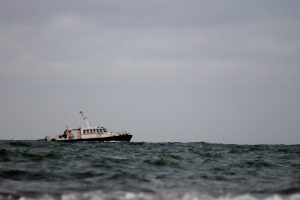Water wars are not simply battles on water; if they were, then almost every war in recorded human history could be categorized as a “water war,” rendering the term virtually meaningless. Rather, the term “water wars,” in order to be analytically useful, refers to conflicts over rights of economic exploitation of water, whether through the support of fishing fleets or the pursuit of undersea resources or access to freshwater for drinking, industrial, and agricultural purposes.
Formulated thus, the concept of “water wars” sits uneasily upon the body of maritime strategic thinking. Historically, naval strategic theory has concentrated on the relevance of water as a means of transit. Theorists such as Alfred Thayer Mahan and Julian Corbett concentrated on the ways that nations could exploit control of the sea (and by extension control of navigable rivers) in order to expand trade, destroy the trade of rivals, and rapidly maneuver ground forces.
Mahan only writes of fishing insofar as the development of a fishing industry tends to enhance maritime interests and maritime cultural virtues, but not as a particularly relevant military or economic phenomenon. Mahan does discuss the economic impact of defeat at sea in terms of the consequences of the loss of fisheries, but the importance of fish relative to trade is not as notable; the book includes just over a dozen mentions of fish, compared with several hundred mentions of “commerce.” For his part, Corbett is explicit about the relationship between fisheries and naval power, suggesting that the former has no impact on the latter. Thus, the question “what do the giants of naval strategic thinking have to say about the exploitation of the sea and about ‘water wars’?” can be answered with a frustrating “not much.”
The legal universe has treated water exploitation a bit differently. Fishing plays a significant role in the earliest legal formulations of freedom of the seas. Indeed, early international law carved out exceptions for fishing fleets, placing them off limits to attacks from naval forces, although such restrictions were often honored in the breach. The exploitation of seabed resources is also bound by a vast, although not necessarily very old, body of law. However, this law has not generally been tested in a modern warfare environment, or in the context of extremely valuable economic installations.
While Mahan and Corbett remain critical touchstones for thinking about maritime strategy, the modern maritime domain is not simply a space through which ships (carrying weapons or soldiers or trade) will pass, but rather a space which must be affirmatively defended because it includes critical economic assets. These assets include offshore drilling platforms, resource extraction systems, and of course fishing fleets. Direct attacks on these installations can cause significant economic damage, especially to important political lobbies, above and beyond the damage inflicted by an anti-commerce campaign. While space does not allow for a full discussion of how to update Corbett and Mahan, such a discussion would involve contemplation of the strength and placement of defensive technologies (from mines to land-based cruise missiles) as well as a rethink of the principles of concentration and dispersal of force that have long laid at the crux of maritime military theory.
































